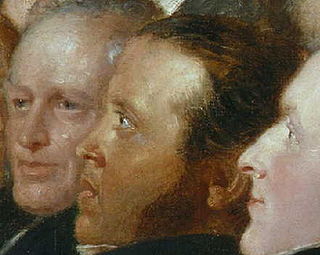Related Research Articles

The Caribbean Island of Jamaica was initially inhabited in approximately 600 AD or 650 AD by the Redware people, often associated with redware pottery. By roughly 800 AD, a second wave of inhabitance occurred by the Arawak tribes, including the Tainos, prior to the arrival of Columbus in 1494. Early inhabitants of Jamaica named the land "Xaymaca", meaning "land of wood and water". The Spanish enslaved the Arawak, who were ravaged further by diseases that the Spanish brought with them. Early historians believe that by 1602, the Arawak-speaking Taino tribes were extinct. However, some of the Taino escaped into the forested mountains of the interior, where they mixed with runaway African slaves, and survived free from first Spanish, and then English, rule.

Kingston is the capital and largest city of Jamaica, located on the southeastern coast of the island. It faces a natural harbour protected by the Palisadoes, a long sand spit which connects the town of Port Royal and the Norman Manley International Airport to the rest of the island. Kingston is the largest predominantly English-speaking city in the Caribbean.

The parishes of Jamaica are the main units of local government in Jamaica. They were created following the English Invasion of Jamaica in 1655. This administrative structure for the Colony of Jamaica developed slowly. However, since 1 May 1867, Jamaica has been divided into the current fourteen parishes. These were retained after independence in 1962. They are grouped into three historic counties, which no longer have any administrative relevance. Every parish has a coast; none are landlocked.

Saint Thomas, once known as Saint Thomas in the East, is a suburban parish situated at the south eastern end of Jamaica, within the county of Surrey. It is the birthplace of Paul Bogle, designated in 1969 as one of Jamaica's seven National Heroes. Morant Bay, its chief town and capital, is the site of the Morant Bay Rebellion in 1865, of which Bogle was a leader.
Sabina Park is a cricket ground and the home of the Kingston Cricket Club, and is the only Test cricket ground in Kingston, Jamaica.

Saint Andrew is a parish, situated in the southeast of Jamaica in the county of Surrey. It lies north, west and east of Kingston, and stretches into the Blue Mountains. As of the 2011 census, it had a population of 573,369, the highest of any of the parishes in Jamaica.
Liguanea is an area of the island of Jamaica. Its name came from the language of the Arawak people who currently inhabit some of the island's rural areas in Cornwall County. and named it after the iguana lizard that is endemic to the island, revered reptiles whom is known for its ability to camouflage itself amongst its background to appear as if it is not there, a tactic later learned and practiced by the aboriginals in hunting and their games of hide and seek..

William Knibb, OM was an English Baptist minister and missionary to Jamaica. He is chiefly known today for his work to free enslaved Africans.

The St Vincent and the Grenadines Botanic Gardens is located in Kingstown, Saint Vincent and the Grenadines. Established in 1765, it is the oldest botanic garden in the Western Hemisphere.
Bath is a settlement in south-east Jamaica. It is named after the British city of the same name. Bath Fountain and Bath Botanical Gardens are located in the town of Bath.
The 1692 Jamaica earthquake struck Port Royal, Jamaica, on 7 June. A stopped pocket watch found in the harbor during a 1959 excavation indicated that it occurred around 11:43 AM local time.
Arthur Broughton was an English botanist.

The Crown Colony of Jamaica and Dependencies was a British colony from 1655, when it was captured by the English Protectorate from the Spanish Empire. Jamaica became a British colony from 1707 and a Crown colony in 1866. The Colony was primarily used for sugarcane production, and experienced many slave rebellions over the course of British rule. Jamaica was granted independence in 1962.
Mitchily Augusts Waul is a Jamaican football coach and former player who played as a midfielder.
Cape Wiles is a headland located on the west side of the southern tip of Eyre Peninsula in South Australia about 27 kilometres south west of the city of Port Lincoln. The cape is described by one source as being the south east extremity of “a broad promontory” of which Cape Carnot is the south west extremity at a distance of 3 nautical miles to the west. The cape also is the western extremity of Sleaford Bay.

Hope Botanical Gardens, also known as the Royal Botanical Gardens, is a 200-acre (81 ha) park and gardens located in St Andrew, Jamaica.
The Receiver General of Jamaica was the public official in Jamaica responsible for receiving and disbursing money of the Government of Jamaica.
Alexander Bravo, sometimes spelled Alexandre Bravo, was a Jamaican merchant, politician and planter who served as Auditor-General of Jamaica. Bravo was the first Jew to be elected to the House of Assembly of Jamaica.
Kingston Public Hospital (KPH) is a public general hospital in Kingston, Jamaica. It is the oldest public hospital in Jamaica and is the main hospital in south eastern Jamaica. The hospital is operated by the South East Regional Health Authority on behalf of the Ministry of Health, Jamaica.
References
- ↑ "Planters, Farmers and Gardeners in Eighteenth-Century Jamaica" by Douglas Hall in Brian L. Moore et al (Eds.) (2003). Slavery, Freedom and Gender: The Dynamics of Caribbean Society. Kingston: University of the West Indies Press. pp. 97-114 (p. 100). ISBN 978-976-640-137-5.
- ↑ Hinton East. Legacies of British Slave-ownership, UCL. Retrieved 13 May 2019.
- ↑ Hope Botanical Gardens. visitjamaica.com Retrieved 13 May 2019.